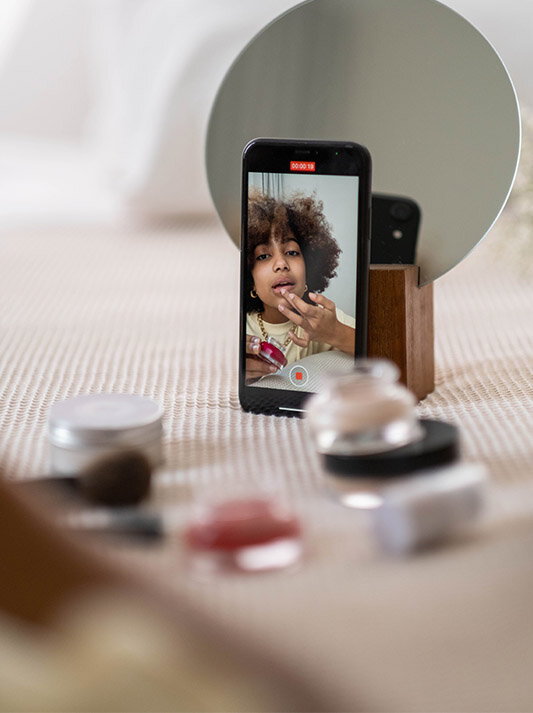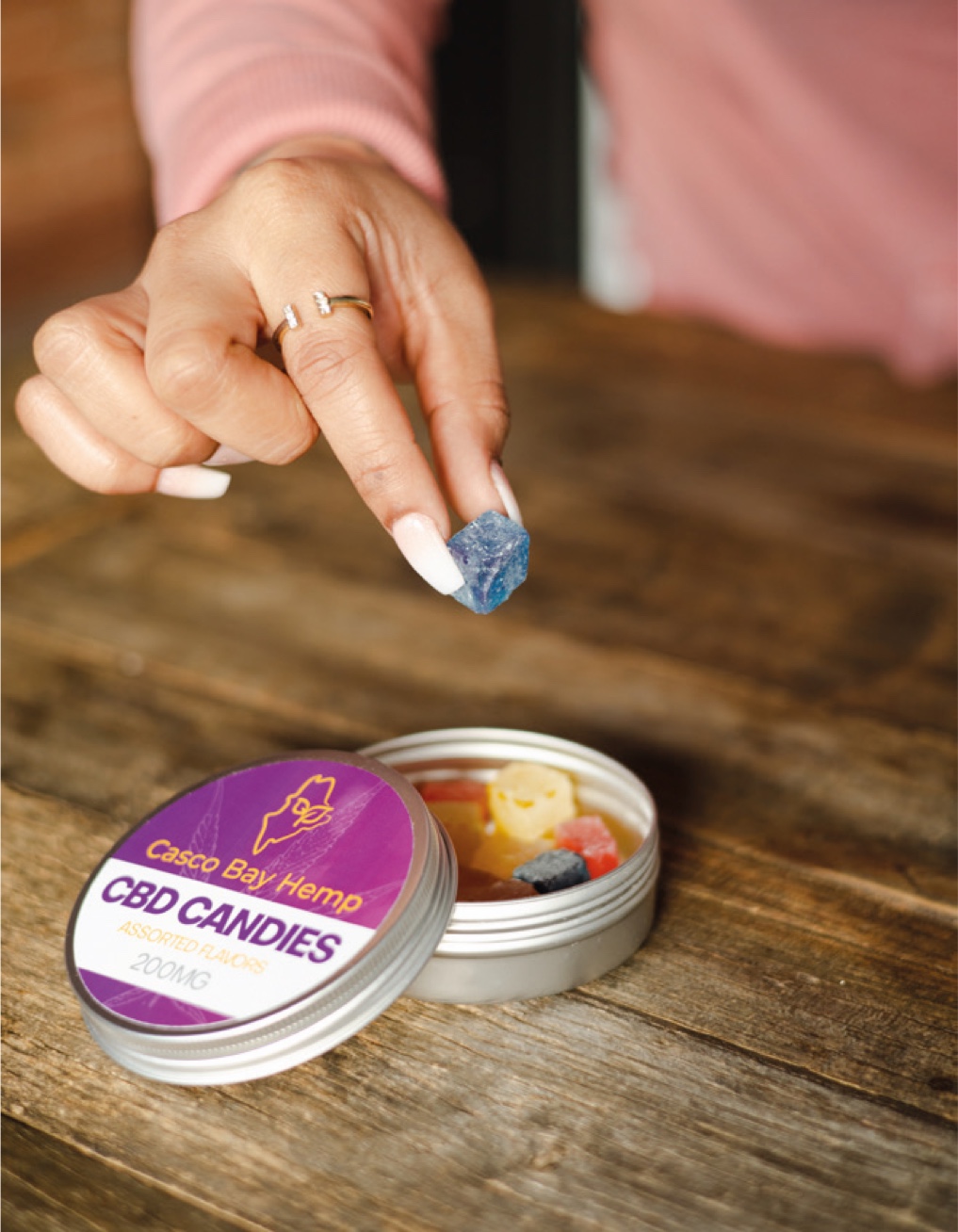COLUMN: CONSUMER PERSPECTIVE
Beyond the filter – Unraveling influencer
-Driven skinification trends
KEYWORDS —
Skinification,
Social Media,
Authenticity,
consumer perspective.
perception.
Consumer,
Testing Consumer,
Testing
Abstract
Studies of major depressive disorder have been correlated with reduced Lactobacillus and Bifidobacteria and symptom severity has been correlated to changes in Firmicutes, Actinobacteria, and Bacteriodes. Gut microbiota that contain more butyrate producers have been correlated with improved quality of life (1).
A study in healthy women providing probiotic yogurt for four weeks showed an improvement in emotional responses as measured by brain scans (2). A subsequent study by Mohammadi et al. (3) investigated the impacts of probiotic yogurt and probiotic capsules over 6 weeks and found a significant improvement in depression-anxiety-stress scores in subjects taking the specific strains of probiotics contained in the yogurt or capsules. Other studies with probiotics have indicated improvements in depression scores, anxiety, postpartum depression and mood rating in an elderly population (4-7).
Other studies have indicated a benefit of probiotic supplementation in alleviating symptoms of stress. In particular, researchers have looked at stress in students as they prepared for exams, while also evaluating other health indicators such as flu and cold symptoms (1). In healthy people, there is an indication that probiotic supplementation may help to maintain memory function under conditions of acute stress.
“
“A study in healthy women providing probiotic yogurt for four weeks showed an improvement in emotional responses as measured by brain scans”
Scrolling through social media can feel like entering a beauty battleground, where influencers bombard you with promises of perfect skin, flawless hair, and a body glowing with well-being. But as we dive into the sea of skincare routines, product endorsements, and self-care hacks, it's time to question the impact of this beauty overload. This is the era of 'skinification,' a trend that urges us to treat our bodies like our faces. As influencers tout the latest and greatest, how does this phenomenon shape our perception of skincare brands, products, and their lofty claims?
'Skinification' now encompasses everyday hair and body products, with brands emphasizing skincare-inspired ingredients and transparency. This trend, popularized on platforms like TikTok, underscores the holistic approach to beauty, extending skincare routines to include all areas of the body, fostering a seamless blend between skincare, makeup, and haircare. Brands and consumers alike prioritize nourishing ingredients for dual benefits, highlighting the significance of considering the body's skin in beauty routines.
Beauty brands are shifting to a hybrid approach, infusing various products, from shampoos to foundations, with potent skincare-like ingredients. In an era where consumers are more informed and demand efficacy from head to toe, the rise of 'skinification' signals a positive shift towards products that deliver real benefits. Consumer preferences for skincare qualities, such as natural ingredients and multifunctionality, have influenced the hair care sector, according to Euromonitor survey results (1). The top priorities for 'skinified' hair care among US respondents are hydration/moisturization (25%) and overall hair health (23%).
But as social media influence strengthens, what does that mean for brands and product developers?
What is driving the narrative?
Consumers' online research and interaction with social media has led to personalized skincare routines, incorporating facial skincare ingredients into color cosmetics, sun care, and personal care items, reflecting a demand for efficacy and individualized beauty. The surge in 'skinification' aligns with the widespread availability of educational content on social media platforms, notably TikTok. Beauty consumers, particularly Gen Z, are progressively influenced by TikTok, whether actively searching for products on the platform or encountering organic content in their feeds (1).
A constant cycle of new trends featured by influencers on platforms such as TikTok has had a heft effect on the skincare industry, redefining beauty standards and routines. Of course, such cycles have always existed, but with the help of apps that reach millions in a matter of a few seconds, the cycle is now on a hyper-drive. Hailey Bieber captions her blushed cheeks as “strawberry girl summer and suddenly there are millions of views under the hashtag strawberry girl. Almost half of Gen Z have bought something based on the recommendations of influencers according to a 2020 (pre-pandemic) Kantar study “(2).
Product developers in skincare should closely heed social media influencers' (SMIs) suggestions as these influencers wield significant influence over consumer preferences and purchasing decisions. Aligning product development with SMI recommendations not only ensures relevance in the market but also enhances the potential for consumer trust and adoption of new skincare products.
The Role of Influence on Consumer Trust:
The impact of influencer-driven content on consumer trust is profound. In a 2021 study (3), Ki et al. addressed the recent shift in consumer trust towards SMIs by investigating the attitudinal ambivalence between trust and distrust in the SMI landscape. Using a mixed-method approach, the research explores how SMIs' personality traits and content attributes influence trust, while perceived ad clutter triggers distrust, and how this attitudinal ambivalence impacts consumer behavior, providing meaningful implications for theory and practice. The credibility and authenticity projected by influencers play a pivotal role in shaping perceptions of skincare brands and products.
Crucial to maintaining consumer trust in the skincare landscape is transparency in disclosing partnerships, fostering trust through clear communication. Consistency in messaging over time builds confidence, while abrupt shifts in product promotion raise skepticism. Demonstrating skincare expertise and collaborating with professionals contribute positively to trust, as do real results and testimonials showcasing authentic transformations. SMIs prioritizing product quality, ethical practices, and genuine benefits significantly contribute to building and maintaining trust in skincare.
The Risk of Endorsement:
The potential impact of influencers endorsing multiple products poses a complex dynamic in the realm of consumer trust. On one hand, influencers often navigate partnerships with various brands, showcasing versatility and a diverse array of products. However, the challenge lies in striking a balance between authenticity and commercial interests. One of TikTok’s most trusted and well-known skincare influencers is dermatologist Derm Doctor, otherwise known as Dr. Muneeb Shah (with over 17 million followers) was even featured in a BBC article (4), for his work debunking skincare myths and highlighting care routines. While Dr. Shah is well positioned to be a trusted source, SMIs often find themselves on shaky ground.
Influencers endorsing a variety of products may raise consumer skepticism about the sincerity of their endorsements, questioning if financial incentives drive promotions. Brands collaborating with SMIs face similar risks, potentially compromising credibility. Striking the right balance and maintaining transparency about partnerships are crucial for SMIs to preserve credibility, ensuring their audience perceives endorsements as genuine, thoughtful recommendations rather than mere promotions—a key consideration for skincare product developers engaging with influencers.
Transparency For the Win:
Successful engagement with social media influencers, not limited to TikTok, hinges on authenticity and creativity for beauty brands. As users across platforms are discerning sponsored content, brands should choose influencers carefully, ensuring alignment with values and the ability to produce authentic and engaging content. Genuine product appreciation from influencers contributes to organic and resonant campaigns on platforms like TikTok (5).
Maintaining trust in the influencer-consumer relationship requires a delicate balance between genuine product advocacy and paid promotions. Influencers should prioritize transparent communication, disclosing partnerships to uphold integrity. This transparency empowers consumers to make informed decisions, acknowledging commercial aspects while interpreting the authenticity of endorsements. For skincare product developers, understanding and supporting this balance is crucial for successful collaboration with influencers.
The evolution of skinification in beauty is poised for acceleration, fueled by consumers prioritizing skin health. The upcoming phase is expected to introduce advanced benefits that center on safeguarding, enhancing, or rejuvenating the skin, addressing concerns like environmental aggressors and anti-pollution measures. Innovations like Youthforia's Pregame Setting Spray, a dual-action moisturizing serum setting spray claiming to shield against pollutants, exemplify the consumer demand for multipurpose, benefit-focused beauty products in alignment with the skin positivity movement.
Meeting consumers where they are and understanding the drivers of their influenced skinification behaviors and needs can help product developers keep up and even participate in these trends. Product developers can leverage social media influencers and trends in skincare for valuable insights to guide product development and innovation by:
- Monitoring influencers and analyzing skincare trends helps product developers identify popular ingredients for innovative products, while emphasizing distinctive features sets them apart in a competitive market.
- Identifying distinctive features of skincare products that resonate with influencers and their audiences allows for strategic emphasis on these unique selling points in both marketing efforts and product development, effectively setting the products apart in a competitive market.
- Stay updated and agile with skincare trends in real-time, adapting product development swiftly to address influencers' and followers' emerging concerns.
Virtual Advantages for Formulators
One of the notable advantages of metaverse personal care is the agility it offers in responding to consumer feedback. In the digital landscape, metaverse brands can gather real-time feedback from users about their virtual products, formulations, and overall experiences. This instantaneous and direct communication channel empowers brands to make rapid iterations and improvements to their offerings. Whether it’s refining the texture of a virtual moisturizer or adjusting the efficacy of a skincare regimen, metaverse brands can swiftly adapt to consumer preferences and emerging trends. This dynamic responsiveness not only enhances user satisfaction but also fosters a sense of co-creation, where consumers actively influence and shape the development of personal care products in the metaverse, marking a new era of consumer-driven innovation.
Even further, in the metaverse, where users from around the world converge, it is paramount for personal care brands to consider diverse cultural preferences and sensitivities. Embracing cultural inclusivity not only promotes a more welcoming and respectful digital environment but also allows brands to reach a broader and more engaged audience. Brands can do this by recognizing and respecting the uniqueness of different beauty ideals and practices across cultures, ensuring that virtual products and experiences are reflective of this diversity. By actively involving individuals from various backgrounds and engaging in cross-cultural dialogue, brands can create a metaverse that celebrates beauty in all its forms, fostering a sense of belonging and acceptance for users, regardless of their cultural heritage or identity. Ultimately, it’s through this inclusive approach that metaverse personal care brands can truly connect with their global audience and cultivate a sense of unity in the digital beauty community.
The Future of Metaverse Personal Care
The future of sensory experiences in the metaverse is a tantalizing frontier poised for remarkable growth and innovation. As technology continues to advance, we can anticipate increasingly lifelike simulations of texture, scent, and other sensory elements, bringing us closer to replicating the tangible sensations of the physical world in the digital realm. Haptic feedback and scent-emitting technologies are likely to become even more sophisticated, offering a truly immersive multisensory experience. Furthermore, as metaverse personal care continues to evolve, it will further blur the lines between virtual and physical beauty, opening up exciting possibilities for customization, personalization, and holistic self-care. To fully embrace this transformative journey, we must stay engaged, explore, and actively participate in shaping the evolving metaverse landscape. As consumers and creators alike, our collective input and imagination will continue to drive the innovation that defines the future of sensory-rich personal care experiences in the metaverse.
Transparency
For the Win:
Successful engagement with social media influencers, not limited to TikTok, hinges on authenticity and creativity for beauty brands. As users across platforms are discerning sponsored content, brands should choose influencers carefully, ensuring alignment with values and the ability to produce authentic and engaging content. Genuine product appreciation from influencers contributes to organic and resonant campaigns on platforms like TikTok (5).
Maintaining trust in the influencer-consumer relationship requires a delicate balance between genuine product advocacy and paid promotions. Influencers should prioritize transparent communication, disclosing partnerships to uphold integrity. This transparency empowers consumers to make informed decisions, acknowledging commercial aspects while interpreting the authenticity of endorsements. For skincare product developers, understanding and supporting this balance is crucial for successful collaboration with influencers.
The evolution of skinification in beauty is poised for acceleration, fueled by consumers prioritizing skin health. The upcoming phase is expected to introduce advanced benefits that center on safeguarding, enhancing, or rejuvenating the skin, addressing concerns like environmental aggressors and anti-pollution measures. Innovations like Youthforia's Pregame Setting Spray, a dual-action moisturizing serum setting spray claiming to shield against pollutants, exemplify the consumer demand for multipurpose, benefit-focused beauty products in alignment with the skin positivity movement.
Meeting consumers where they are and understanding the drivers of their influenced skinification behaviors and needs can help product developers keep up and even participate in these trends. Product developers can leverage social media influencers and trends in skincare for valuable insights to guide product development and innovation by:
- Monitoring influencers and analyzing skincare trends helps product developers identify popular ingredients for innovative products, while emphasizing distinctive features sets them apart in a competitive market.
- Identifying distinctive features of skincare products that resonate with influencers and their audiences allows for strategic emphasis on these unique selling points in both marketing efforts and product development, effectively setting the products apart in a competitive market.
- Stay updated and agile with skincare trends in real-time, adapting product development swiftly to address influencers' and followers' emerging concerns.


Studies of major depressive disorder have been correlated with reduced Lactobacillus and Bifidobacteria and symptom severity has been correlated to changes in Firmicutes, Actinobacteria, and Bacteriodes. Gut microbiota that contain more butyrate producers have been correlated with improved quality of life (1).
A study in healthy women providing probiotic yogurt for four weeks showed an improvement in emotional responses as measured by brain scans (2). A subsequent study by Mohammadi et al. (3) investigated the impacts of probiotic yogurt and probiotic capsules over 6 weeks and found a significant improvement in depression-anxiety-stress scores in subjects taking the specific strains of probiotics contained in the yogurt or capsules. Other studies with probiotics have indicated improvements in depression scores, anxiety, postpartum depression and mood rating in an elderly population (4-7).
Other studies have indicated a benefit of probiotic supplementation in alleviating symptoms of stress. In particular, researchers have looked at stress in students as they prepared for exams, while also evaluating other health indicators such as flu and cold symptoms (1). In healthy people, there is an indication that probiotic supplementation may help to maintain memory function under conditions of acute stress.
References and notes
- Stelmaszcyzyk, O. (2023, May, 19). Skinification and the influence of TikTok in the US.https://www.euromonitor.com/article/skinification-and-the-influence-of-tiktok-in-the-us.
- Williams, R. (2020, March 2) Gen Z relies on influencers for purchase decisions, Kantar says. https://www.marketingdive.com/news/gen-z-relies-on-influencers-for-purchase-decisions-kantar-says/582890/.
- Ki, C. W., Chow, T. C., & Li, C. (2023). Bridging the trust gap in influencer marketing: Ways to sustain consumers’ trust and assuage their distrust in the social media influencer landscape. International Journal of Human–Computer Interaction, 39(17), 3445-3460. https://www.tandfonline.com/doi/full/10.1080/10447318.2022.2097785
- Bobby, H. (2023, April 3). Ramadan: How to look after your skin during holy month. BBC. https://www.bbc.com/news/newsbeat-65162353.
- Morris, E. (2023, September 27). Social Media with TikTok Influencers - Authenticity and creativity are key factors in their success. Beauty|Packaging. https://www.beautypackaging.com/contents/view_experts-opinion/2023-09-27/beauty-brands-that-are-winning-in-social-media-with-tiktok-influencers/.

